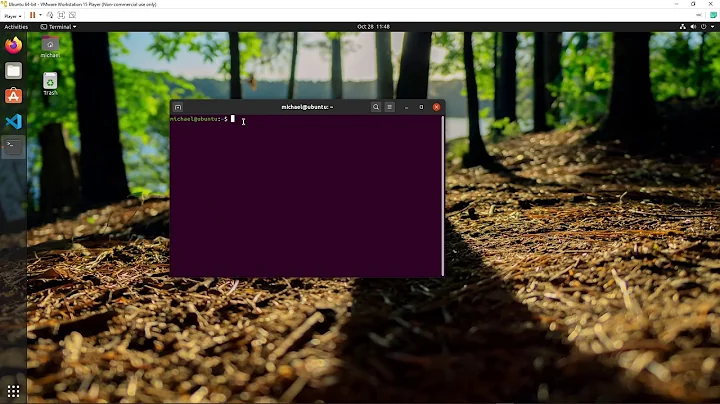Reading and writing to serial port in C on Linux
I've solved my problems, so I post here the correct code in case someone needs similar stuff.
Open Port
int USB = open( "/dev/ttyUSB0", O_RDWR| O_NOCTTY );
Set parameters
struct termios tty;
struct termios tty_old;
memset (&tty, 0, sizeof tty);
/* Error Handling */
if ( tcgetattr ( USB, &tty ) != 0 ) {
std::cout << "Error " << errno << " from tcgetattr: " << strerror(errno) << std::endl;
}
/* Save old tty parameters */
tty_old = tty;
/* Set Baud Rate */
cfsetospeed (&tty, (speed_t)B9600);
cfsetispeed (&tty, (speed_t)B9600);
/* Setting other Port Stuff */
tty.c_cflag &= ~PARENB; // Make 8n1
tty.c_cflag &= ~CSTOPB;
tty.c_cflag &= ~CSIZE;
tty.c_cflag |= CS8;
tty.c_cflag &= ~CRTSCTS; // no flow control
tty.c_cc[VMIN] = 1; // read doesn't block
tty.c_cc[VTIME] = 5; // 0.5 seconds read timeout
tty.c_cflag |= CREAD | CLOCAL; // turn on READ & ignore ctrl lines
/* Make raw */
cfmakeraw(&tty);
/* Flush Port, then applies attributes */
tcflush( USB, TCIFLUSH );
if ( tcsetattr ( USB, TCSANOW, &tty ) != 0) {
std::cout << "Error " << errno << " from tcsetattr" << std::endl;
}
Write
unsigned char cmd[] = "INIT \r";
int n_written = 0,
spot = 0;
do {
n_written = write( USB, &cmd[spot], 1 );
spot += n_written;
} while (cmd[spot-1] != '\r' && n_written > 0);
It was definitely not necessary to write byte per byte, also int n_written = write( USB, cmd, sizeof(cmd) -1) worked fine.
At last, read:
int n = 0,
spot = 0;
char buf = '\0';
/* Whole response*/
char response[1024];
memset(response, '\0', sizeof response);
do {
n = read( USB, &buf, 1 );
sprintf( &response[spot], "%c", buf );
spot += n;
} while( buf != '\r' && n > 0);
if (n < 0) {
std::cout << "Error reading: " << strerror(errno) << std::endl;
}
else if (n == 0) {
std::cout << "Read nothing!" << std::endl;
}
else {
std::cout << "Response: " << response << std::endl;
}
This one worked for me. Thank you all!
Related videos on Youtube
Lunatic999
Updated on March 18, 2020Comments
-
Lunatic999 about 4 years
I'm trying to send/receive data over an USB Port using FTDI, so I need to handle serial communication using C/C++. I'm working on Linux (Ubuntu).
Basically, I am connected to a device which is listening for incoming commands. I need to send those commands and read device's response. Both commands and response are ASCII characters.
Everything works fine using GtkTerm but, when I switch to C programming, I encounter problems.
Here's my code:
#include <stdio.h> // standard input / output functions #include <stdlib.h> #include <string.h> // string function definitions #include <unistd.h> // UNIX standard function definitions #include <fcntl.h> // File control definitions #include <errno.h> // Error number definitions #include <termios.h> // POSIX terminal control definitions /* Open File Descriptor */ int USB = open( "/dev/ttyUSB0", O_RDWR| O_NONBLOCK | O_NDELAY ); /* Error Handling */ if ( USB < 0 ) { cout << "Error " << errno << " opening " << "/dev/ttyUSB0" << ": " << strerror (errno) << endl; } /* *** Configure Port *** */ struct termios tty; memset (&tty, 0, sizeof tty); /* Error Handling */ if ( tcgetattr ( USB, &tty ) != 0 ) { cout << "Error " << errno << " from tcgetattr: " << strerror(errno) << endl; } /* Set Baud Rate */ cfsetospeed (&tty, B9600); cfsetispeed (&tty, B9600); /* Setting other Port Stuff */ tty.c_cflag &= ~PARENB; // Make 8n1 tty.c_cflag &= ~CSTOPB; tty.c_cflag &= ~CSIZE; tty.c_cflag |= CS8; tty.c_cflag &= ~CRTSCTS; // no flow control tty.c_lflag = 0; // no signaling chars, no echo, no canonical processing tty.c_oflag = 0; // no remapping, no delays tty.c_cc[VMIN] = 0; // read doesn't block tty.c_cc[VTIME] = 5; // 0.5 seconds read timeout tty.c_cflag |= CREAD | CLOCAL; // turn on READ & ignore ctrl lines tty.c_iflag &= ~(IXON | IXOFF | IXANY);// turn off s/w flow ctrl tty.c_lflag &= ~(ICANON | ECHO | ECHOE | ISIG); // make raw tty.c_oflag &= ~OPOST; // make raw /* Flush Port, then applies attributes */ tcflush( USB, TCIFLUSH ); if ( tcsetattr ( USB, TCSANOW, &tty ) != 0) { cout << "Error " << errno << " from tcsetattr" << endl; } /* *** WRITE *** */ unsigned char cmd[] = {'I', 'N', 'I', 'T', ' ', '\r', '\0'}; int n_written = write( USB, cmd, sizeof(cmd) -1 ); /* Allocate memory for read buffer */ char buf [256]; memset (&buf, '\0', sizeof buf); /* *** READ *** */ int n = read( USB, &buf , sizeof buf ); /* Error Handling */ if (n < 0) { cout << "Error reading: " << strerror(errno) << endl; } /* Print what I read... */ cout << "Read: " << buf << endl; close(USB);What happens is that
read()returns 0 (no bytes read at all) or block until timeout (VTIME). I'm assuming this happens becausewrite()does not send anything. In that case, device wouldn't receive command and I cannot receive response. In fact, turning off the device while my program is blocked on reading actually succeded in getting a response (device sends something while shutting down).Strange thing is that adding this
cout << "I've written: " << n_written << "bytes" << endl;right after
write()call, I receive:I've written 6 byteswhich is exactly what I expect. Only my program doesn't work as it should, like my device cannot receive what I'm actually writing on port.
I've tried different things and solution, also regarding data types (I've tried using std::string, such as
cmd = "INIT \r"orconst char) but nothing really worked.Can someone tell me where I'm wrong?
Thank you in advance.
EDIT: Previously version of this code used
unsigned char cmd[] = "INIT \n"and also
cmd[] = "INIT \r\n". I changed it because command sintax for my device is reported as<command><SPACE><CR>.I've also tried avoiding the
O_NONBLOCKflag on reading, but then I only block until forever. I've tried usingselect()but nothing happens. Just for a try, I've created a waiting loop until data is avaliable, but my code never exit the loop. Btw, waiting orusleep()is something I need to avoid. Reported one is only an excerpt of my code. Complete code needs to work in a real-time environment (specifically OROCOS) so I don't really want sleep-like function.-
 jww about 5 years
jww about 5 yearsstd::coutis C++. Generally speaking, your MCVE should stick to one language unless you suspect a bad interaction. Otherwise some folks start arguing C++ is not C.
-
-
Magn3s1um almost 11 yearsAlso, some USB drives have fast write caching which means that it sits in a buffer before actually getting written right?
-
Lunatic999 almost 11 yearsThank you for your answer! I've tried what you suggest but nothing changed. I've edited my question with more information... Any other ideas? Thank you again
-
Lunatic999 almost 11 yearsThank you for the tip, but
\r\nis not my problem. I've tried it and nothing really changes. Other ideas? -
 radarhead almost 11 years@Lunatic999 I just read your code again and the line
radarhead almost 11 years@Lunatic999 I just read your code again and the lineint n_written = write( USB, cmd, sizeof(cmd) -1 );kind of bothers me. Would you be willing to test usingint n_written = write(USB, cmd, strlen(cmd));? That's what I have in a program I worked on, very similar setup like yours, communication through a ttyUSB. -
guest almost 11 yearsusleep() is just for debugging/testing. Once it's working, you can switch to select() to wait just the necessary time for a response.
-
guest almost 11 yearsHow did you write 7 bytes? It's "INIT \r" which is 6 bytes... Are you writing the trailing NULL character? Some systems interpret a NULL character as end-of-communication...
-
Lunatic999 almost 11 yearsSorry, 7 bytes was my error in reporting it. I definitely write the right number of bytes (6). 7 was referring to an attempt with
\r\nending. I'll edit my question. Anyway I've fixed everything and now it works. I will post the final code in case someone should need something similar. Really thank you for you answers! -
josaphatv almost 10 yearsYour line
response.append(&buf);doesn't compile for me. Neither doeswhile(buf != '\r' && n > 0);. Are these typos or am I missing something? -
Fritz about 9 yearsThe code you suggest for sending
int n_written = write( USB, cmd, sizeof(cmd) -1)doesn't really work for large buffers. In that case you'd need a loop like the one you show above, but withn_written = write( USB, cmd + spot, command_length - spot). Also you'd have to use the length to terminate the loop, instead of checking each character individually. -
rumpel over 6 years
cfmakeraw()already sets a bunch of attributes. You don’t need these lines:tty.c_cflag &= ~CSIZE; tty.c_cflag |= CS8; tty.c_cflag &= ~PARENB; -
 chux - Reinstate Monica almost 4 yearsWhy the cast of
chux - Reinstate Monica almost 4 yearsWhy the cast of(speed_t)incfsetospeed (&tty, (speed_t)B9600);? At worst, it silents a useful warning that the constant used does not fit in aspeed_t. At best, it is unnecessary.






